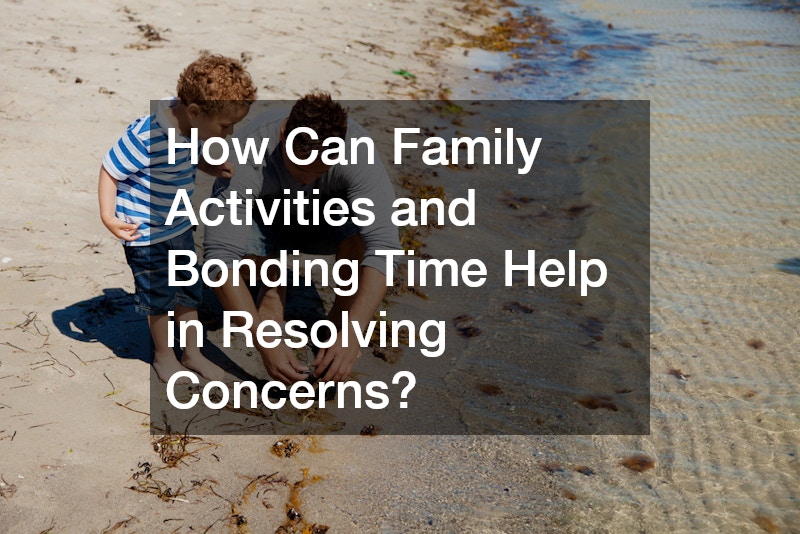How to Resolve Family Concerns Without Conflict


Addressing family concerns without conflict is crucial for maintaining a harmonious household. Families who manage issues peacefully can build stronger relationships and foster an environment where all members feel valued and heard. Resolving family concerns amicably can prevent emotional strain and even reduce related health issues such as those that might lead individuals to seek help in emergency rooms or from chiropractors. Unresolved conflicts can create long-term tension, leading to stress, anxiety, and even strained relationships that impact daily interactions. By adopting effective communication strategies and proactive problem-solving techniques, families can navigate challenges with greater ease. A supportive and understanding family dynamic not only strengthens emotional bonds but also promotes overall well-being, ensuring that conflicts are handled in a way that reinforces trust and unity.
Additionally, fostering a culture of open dialogue and active listening can help family members express their concerns without fear of criticism or dismissal. Setting clear expectations and boundaries allows individuals to address issues before they escalate into larger disputes. When family members approach disagreements with patience and a willingness to compromise, they create a positive atmosphere that encourages growth and cooperation.
1. What Are the Common Causes of Family Concerns?

Family concerns often arise from financial matters, which can place a significant strain on family relationships if not addressed promptly. In some cases, differences in parenting styles can lead to misunderstandings, creating tension and discord. Communication problems are another common cause, where expressing needs and concerns can become difficult, leading to unresolved issues that escalate into conflicts.
Financial disagreements may involve budgeting issues, debt management, and decisions about major expenditures, all of which require careful negotiation and compromise. Parenting styles can differ significantly between partners, sometimes resulting in conflicts about discipline, academic expectations, or lifestyle choices. Moreover, poor communication can exacerbate these issues, as unspoken expectations and assumptions breed further misunderstandings.
Families must also recognize the impact of external stressors, such as job pressures or health-related concerns, like the need for hormone treatment or thyroid therapy from a thyroid therapy clinic. These external factors can exacerbate existing family issues by adding stress to an already tense situation. Acknowledging the role of these stressors can help families address concerns more comprehensively.
2. How Can Effective Communication Help in Resolving Family Concerns?
Effective communication is the backbone of resolving family concerns, as it lays the groundwork for understanding and collaboration. By employing active listening skills, family members can better understand each other’s perspectives, which is crucial in preventing misunderstandings. This approach can diffuse tensions early, reducing the need for more drastic measures, such as neuro rehab for stress-induced conditions.
Implementing communication techniques, such as ‘I’ statements, can also be beneficial in expressing personal feelings without casting blame. For instance, saying “I feel overwhelmed when discussing finances” is more constructive than blaming another family member. This strategy encourages openness and a willingness to find cooperative solutions to family concerns.
Additionally, regularly scheduled family meetings can serve as platforms for discussing issues before they escalate into conflicts. These meetings should focus on open dialogue and problem-solving, where everyone has the opportunity to speak and be heard. By doing so, families can address potential concerns and create action plans that align with their shared values and goals.
3. What Role Does Empathy Play in Addressing Family Concerns?
Empathy is critical in resolving family concerns, as it allows individuals to see situations from the perspectives of other family members. By acknowledging and respecting how others feel, empathy fosters a supportive environment where issues can be discussed constructively. This approach can prevent conflicts from escalating, much like how vascular surgery addresses underlying health issues before they become life-threatening emergencies.
In practice, showing empathy involves actively listening to other family members and validating their feelings, even if you do not fully agree with their viewpoint. This does not mean conceding to every demand but rather recognizing the validity of others’ experiences and emotions. Fostering empathy ensures that all family members feel valued and understood, which can be a powerful tool in preventing conflicts.
Families can also benefit from empathy-building exercises, such as perspective-taking activities or even role reversals, which can help family members understand each other’s roles and challenges more clearly. This insight can lead to more compassionate and effective resolutions to family concerns, supporting the idea that understanding is key to harmony.
4. How Can Setting Family Goals Aid in Resolving Concerns?

Setting shared family goals is an excellent strategy for resolving concerns, as it aligns family members with a common purpose. These goals can provide a sense of direction and reduce the likelihood of disputes by emphasizing collective achievements over individual disagreements. A united focus can be as effective in nurturing a family’s strength as thyroid specialists are in managing thyroid health through targeted therapy.
Family goals might include financial objectives, such as saving for a vacation or a future educational fund for children, which require cooperation and team effort. These goals foster a sense of unity and shared responsibility, encouraging family members to work together rather than against each other. Having a clear set of objectives allows families to prioritize their efforts, minimizing conflicts about less important issues.
Regularly reviewing and updating these goals keeps everyone aligned and accountable, while also allowing for adjustments in response to changing circumstances. Setting an example of adaptability and compromise can positively influence children, teaching them the value of cooperation and strategic planning in resolving household concerns.
5. What Strategies Can Be Utilized for Conflict Prevention in Families?
Preventative strategies are vital in managing family concerns before they develop into full-blown conflicts. Anticipating potential issues and establishing preemptive measures can avert misunderstandings. For instance, just as hair loss treatment can prevent the progression of balding, so too can preemptive family strategies halt the advance of relational discord.
Establishing clear communication channels and expectations is essential in preventing misunderstandings, which often lead to conflicts. Families should prioritize regular communication to discuss daily activities, responsibilities, and concerns. Such consistency helps prevent the buildup of frustration or resentment that often precipitates disputes.
Another effective strategy is practicing flexibility and compromise, allowing family members to navigate minor disagreements without escalating tensions. By approaching challenges with an open mind and willingness to adapt, families can stave off conflicts and maintain a peaceful coexistence. This practice nurtures an environment where resolution is prioritized over confrontation.
6. How Can Seeking External Help Assist in Resolving Family Concerns?
When family concerns become too overwhelming to handle internally, seeking external help can provide valuable support. Professionals such as counselors, therapists, or mediators offer neutral perspectives and can facilitate structured communication, much like how rehabilitation therapy aids in physical recovery processes. Their expertise can help families uncover underlying issues and develop effective strategies for resolution.
Counseling sessions offer a safe space for family members to express their thoughts and emotions openly, guided by an impartial third party. This environment can be especially beneficial when addressing deep-seated issues that might otherwise lead to persistent tension or emotional distress requiring neuro rehab interventions. Professional guidance can help families develop healthier communication patterns and solve conflicts collaboratively.
In cases where specialized attention is needed, families might benefit from niche therapy services, such as hormone treatments or local softwave therapy, depending on the nature of the issues at hand. These expert interventions can support both physical and emotional well-being, facilitating a holistic approach to resolving family concerns.
7. What Impact Does Setting Healthy Boundaries Have On Family Dynamics?

Healthy boundaries are an essential component of maintaining respectful and balanced family dynamics. Establishing clear boundaries helps define personal space and individual roles within the family, preventing misunderstandings and conflicts. Similar to how vascular surgery restores proper function in the body, setting boundaries can restore harmony in family relations.
Boundaries communicate expectations regarding behaviors, privacy, and responsibilities, creating a structure within which family life can thrive. When family members understand and respect each other’s limits, it fosters trust and mutual respect, essential ingredients for lasting familial harmony. This respect for boundaries not only reduces conflict but also enhances individual well-being and autonomy.
By regularly discussing and renegotiating these boundaries as needed, families can adapt to changes over time, such as shifting roles as children grow or as needs evolve. This continuous dialogue ensures that boundaries remain relevant and respected, reflecting the family’s changing dynamics and supporting a peaceful coexistence.
8. How Important Is Patience in Resolving Family Concerns Without Conflict?
Patience is a vital trait in the process of addressing family concerns without resorting to conflict. Patience allows family members the time to process issues thoroughly and to respond thoughtfully rather than react impulsively. Just as a thyroid specialist takes time to diagnose and treat thyroid issues patiently, so too must family members approach their challenges with calm deliberation.
Practicing patience involves actively waiting for the right moment to address concerns, ensuring that discussions take place in conducive environments where all parties can engage without distraction. This approach helps prevent escalations that could lead to arguments or deeper rifts within the family. Patience nurtures a space for considered dialogue, enabling positive and constructive resolutions.
Moreover, patience is a manifestation of respect, signaling an individual’s commitment to fostering understanding and collaboration within the family. It demonstrates a willingness to invest time and effort in maintaining healthy relationships, ultimately leading to deeper familial bonds and resilience against future challenges.
9. What Are Some Techniques for Managing Emotions During Family Discussions?
Effective emotional management is crucial during family discussions to ensure constructive outcomes. Techniques such as deep breathing, mindfulness, and setting conversational intentions can help maintain a calm and balanced state during potentially heated exchanges. These approaches are akin to the steady progress seen in hair loss treatment, where consistent effort yields positive change over time.
Deep breathing exercises can be particularly effective in managing stress and calming nerves, allowing individuals to engage in discussions with a clear mind. Mindfulness practices, such as grounding and focus exercises, help family members remain present and attentive, facilitating empathetic listening and reducing emotional overwhelm. These practices promote a peaceful atmosphere, conducive to open and respectful dialogue.
Setting conversational intentions before engaging in discussions can also be beneficial, as it allows individuals to articulate their desired outcomes clearly. This focus on positive, solution-oriented dialogue discourages blame and encourages collaborative problem-solving. Techniques for managing emotions enable families to navigate difficult conversations amicably, avoiding conflicts that could strain relationships.
10. How Can Family Activities and Bonding Time Help in Resolving Concerns?

Engaging in regular family activities and dedicating time for bonding can strengthen familial relationships and aid in resolving concerns. Spending quality time together in enjoyable activities, such as outings or game nights, fosters a sense of unity and belonging. These experiences are as rejuvenating for relationships as rehabilitation therapy is for physical recovery.
Family activities create positive shared memories that reinforce emotional connections, making it easier to address conflicts when they arise. The trust and camaraderie that develop through such interactions can enhance communication and collaboration, providing a solid foundation for resolving family concerns. These moments of connection remind family members of their love and support for one another, even amid challenges.
Moreover, shared activities often present opportunities to address concerns indirectly, as relaxed settings can promote spontaneous discussions about issues and solutions. This indirect approach can be less confrontational, allowing concerns to be voiced and addressed within the context of supportive and enjoyable experiences, thus strengthening family bonds.
Resolving family concerns without conflict requires dedication, understanding, and strategic efforts. By employing effective communication, fostering empathy, setting goals, and utilizing external help when needed, families can create a harmonious environment where every member feels valued. Family activities, patience, and the establishment of healthy boundaries complete a holistic approach to managing concerns, ensuring long-lasting relationships and a peaceful home life. These strategies embody a commitment to collaboration, compassion, and positive change, echoing the professional practices of chiropractors and vascular surgery in transforming health and well-being. Families who actively integrate these methods will likely find their bonds strengthened, their conflicts minimized, and their lives enriched.